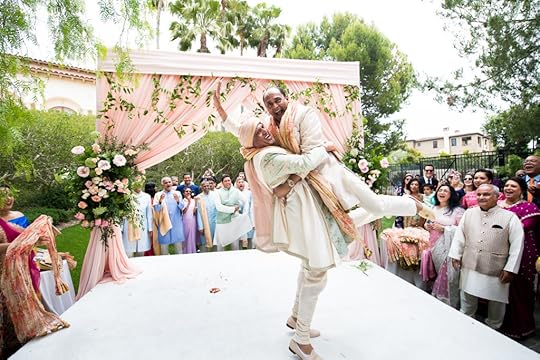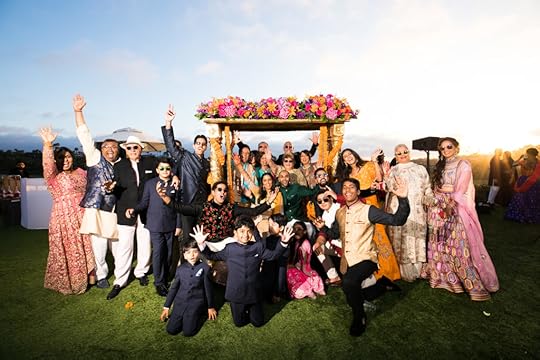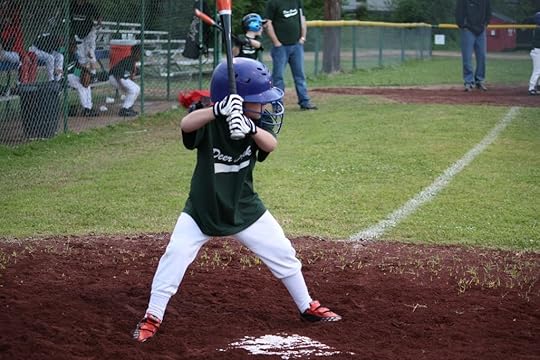Roma Khetarpal's Blog, page 7
September 17, 2019
Your Kids: Are They Ordinary or Extraordinary?

When we are away from our kids, we only talk about them: the funny things they say and do, the bratty quick responses they give, the challenges that we face with them, the dilemmas of small happenings at school, and so on. You know, the ordinary day-to-day stuff. You do it, I still do it (and my “kids” are adults), everyone does it! We find ourselves saying, “Can’t wait to get away for a few days” or “So ready for a break!” and even “So looking forward to some ME time” and, if we’re lucky, “Yeah! Viva Las Vegas! Woohoo!” You know what I mean. You’ve said it, I’ve said it, we’ve all said it. And then, magically, before we even realize it, their magnetic powers start to make their way into our “get away” moments and lo and behold, we are talking about them, the very things we were relieved to detach from for a temporary amount of time.
I remember our very first “alone time” trip (It was Jamaica! Amazing!). We were so exhausted with the all the pre-planning of our trip and had just gotten on the 4:00 a.m. shuttle when I said, “I love my kids but I really needed this.” My wonderful husband put his arm around my shoulders and gave me a little squeeze. The not-more-than-a-decade older couple sitting on the other side of the aisle, at an arm-length distance, overheard us, smiled and said, “Awww! We remember those days!” And then followed the trigger questions: “How old are they? Girls or boys?” Before you know it, it was, “Who’s older? Who’s watching them?” That’s pretty much all we needed. We did a great job with talking about kids, theirs, and ours for the rest of the three-hour shuttle ride!! Sound familiar?
My kids aren’t and weren’t Olympiads or academically off the charts or anything out of the ORDINARY. They were your regular funny, loving, exuberant, full-of-life, ordinary children. Few of us have children with beyond ordinary abilities and yet there’s nothing ordinary about them! My kids play an extraordinary role in my life. They bring the EXTRAORDINARY to me, to my home, to my ordinary moments. And every single time, they do it effortlessly, naturally, and smoothly! Why else would I (we) be sooooo happy to talk about them almost as soon as we get away from them?
Moreover, they don’t just bring the EXTRAORDINARY TO me, they also bring the EXTRAORDINARY out IN me. How else could I have the superhuman capacity to adore them on two hours of sleep? How else could I involve my whole being and 40 hours of research on the right school for them? How else could their one little hug relieve the exhaustion of a 120-hour work week?
Can ordinary kids possess such extraordinary talents? Yup, they are EXTRA-ordinary because they possess all the, well, extras to enhance the ordinary! Only extra-ordinary kids can super-size our ordinary human capacities to love unconditionally, be patient, be kind, and be empathetic. Only extra-ordinary kids can shrink feelings of sadness, loneliness, and illness with their natural magnifying powers of compassion, humor, and wit. There’s nothing ordinary about that! Each one of them is beyond-ordinary. Each one is EXTRAORDINARY.
Don’t you think?
The post Your Kids: Are They Ordinary or Extraordinary? appeared first on Tools of Growth.
September 10, 2019
The Parenting Pedestal

I was at the mall yesterday, and outside the dressing room, I could hear a mom screaming at her two boys (maybe nine and six years old) about how they were “ungrateful little shits” and didn’t “deserve the privilege of being in a mall.” The dad, who was just a few feet away, heard this and walked over, and the mom then went off on him about not watching “his ill-mannered bratty boys fighting over a stupid toy car” while she was trying on outfits. The dad then joined in with “I’m so sick of your fighting. That’s it. You’re grounded. We’re going home.”
When we are mad at our children, we often throw these statements at them:
I do so much for you, but you are so ungrateful.
I sacrificed my own desires for you.
I spent my whole life on your well-being.
If it weren’t for me, you wouldn’t even be born.
I put food on the table and a roof over your head.
I call the shots while you’re in my house.
What is this Parenting Pedestal that we stand so high on? Are we doing a huge favor to our kids in raising them? Seriously, let’s think about this for a second. All these “I” statements are emotionally charged ego trips that burden our children with guilt and unworthiness.
It’s interesting to observe that in each one of my parenting talks and workshops guilt is the most commonly spoken about suffering in parenting. It’s number one. Parents complain about it all the time. They feel trapped when they feel guilty. It makes them feel that they aren’t doing a good job, and that opens the door to doubt and worry and, yes, unworthiness. Guilt makes us feel that we are not good-enough parents. Isn’t it ironic then that what we detest most we unconsciously pass on to our kids when we are angry at them.
Why do we step onto this ego-laden parenting pedestal? Perhaps it makes us feel—at least temporarily—that we are in control, that we have the power because we are the ones who birthed our children and brought them into this world. Here’s a humbling perspective from Khalil Gibran in his poem “On Children.”
On Children
Khalil Gibran
Your children are not your children.
They are the sons and daughters of Life’s longing for itself.
They come through you but not from you,
And though they are with you yet they belong not to you.
You may give them your love but not your thoughts,
For they have their own thoughts.
You may house their bodies but not their souls,
For their souls dwell in the house of tomorrow,
which you cannot visit, not even in your dreams.
You may strive to be like them,
but seek not to make them like you.
For life goes not backward nor tarries with yesterday.
You are the bows from which your children
as living arrows are sent forth.
The archer sees the mark upon the path of the infinite,
and He bends you with His might
that His arrows may go swift and far.
Let your bending in the archer’s hand be for gladness;
For even as He loves the arrow that flies,
so He loves also the bow that is stable.
This poem needs to hang in every home where children are present and should be a required study for every parent. How did we forget that we have zero ownership of our kids? How can we assume that without us they are doomed? How do we forget that our children are our teachers and that parenting is truly a master class, one that can help you master your own behavior? How do we not realize that the experiences that our children give to us are a red-carpet invitation to growth? Don’t we see how by simply having our children in our lives we are better human beings, more patient, more kind, more compassionate, more lighthearted and loving?
Parenting is an opportunity for us to recognize our own triggers and our own shortcomings. It is a platform for self-transformation, but this can only be achieved if we get off our parenting pedestal and commit to being, as Khalil Gibran says, “a stable bow” for our kids. That’s what our children need from us. There are enough pressures with peers and experiences in the outside world that will cause our kids to feel “I’m not good enough,” but we, their parents, should never inflict this on them, for we are their safety net, their safe haven, and their anchors.
We need to get off our guilt-inducing parenting pedestal for we are not more superior than our children. On a human level, our existence is not more important than theirs. Being a parent or an adult taking care of children does not give us a free pass. It does not put us in control. Parenting is not a dictatorship; it is a directorship. It is not a power position; it is an empower position. It would behoove us to remember this most when we are angry with our kids. So next time you are right, practice being kind first.
September 3, 2019
Celebrate “Mindful” Pajamas-at-Home Day

On Sunday I actually hung around the house in pajamas until 4 p.m., and I must admit it was exactly the prescription I needed to recover from two busy work weeks. Here are the highlights of my experience:
My Sunday morning treat—masala-chai and half a sourdough toast with butter—never tasted better!
I felt like there was no-thing to do and nowhere to be.
My mind and body were in a state of deep relaxation.
I breathed more deeply, and my heart rate was even all day.
Feeling lighthearted, I laughed more often and more loudly at silly things.
I took a super long shower.
I spent an hour experimenting with a new eyeshadow palette that I bought two months ago.
Taking the time to pick and chop vegetables for a delicious salad made me feel oh, so good.
I ate lunch slowly and thoroughly enjoyed it.
Catching up on the phone with my mom and a dear high school friend made my heart happy.
My husband complimented me twice with an “I love when you smile so big.”
I devoured two episodes of Mad Men with full attention, without any mobile devices around me.
All of this from 8 to 4. Now that in itself is an amazing treat for the soul!
Yes, I know you’re thinking that it’s easy for me to do this when I do not have any young children—or any children for that matter—at home. But I do have an elderly mum-in-law at home and a financially brilliant yet domestically challenged hubby in the house. I found time to fix their meals and have a lengthy discussion with my mum-in-law about a walker that needs to be replaced for her.
To top it off, I never felt so present among a large group of friends as I did during that evening’s dinner event. And, yes, I truly believe that being in my pajamas paved the way for my state of mind on Sunday!
So all of you parents with children who just went back to school, do take a pajama day to recover from the busyness that accompanies this big transitional undertaking! Better yet, schedule one for your kids or with your kids because they are undoubtedly feeling not only their own pressures over the transition from unscheduled summer holidays to scheduled (and sometimes overscheduled) school routines but also from the busy vibes they feel at home.
I’m sure you’ve all heard about or participated in National Pajamas-at-Work Day on April 16th each year. Let’s start something new together during a time that you need it most!
I hereby declare the Sunday after Labor Day weekend as National “Mindful” Pajamas-at-Home Day! Are you in?
August 27, 2019
Back to School: Using Your Heart Space and Not Your Head Space

I know I just wrote a post with some back-to-school tips, but every day I still hear about the bittersweet “trauma” that parents feel as they send off their children. Parents who have younger children are excited to have their routines back, but they are inundated and exhausted by the back-to-school “to-do” list. Parents with older children—especially those with young adults who are going off to college—are experiencing separation anxiety, worrying about their children’s upcoming school year and crazy-busy helping them move in.
When we are anxious and stressed emotionally and physically, we get stuck in our head space with thoughts like these:
“We still haven’t received all the books.”
“I haven’t found the right lunch box yet.”
“I need to pick up the immunization forms from the doctor.”
“Is my 18-year-old ready for an independent life?”
“Will they make the right decisions?”
The worry and doubts go on and on—like the ticker at the bottom of a newscast!
Parenting is a job of the heart. Our most precious emotion for our children is love, which comes from the heart space, yet we handle our kid’s emotions and generally raise them from our head space. And under stress our head space is guided by fear. This happens all the time, when our kids have made a mistake, for example. That is when they need a hug and understanding most, yet we end up scolding them and punishing them first. We say it’s because we want to protect them, which is true, but we end up answering to our fear and parenting from our head space! That’s a misalignment from our deeper intention of connection and love.
When our children are dealing with their own fears of stepping into the unknowns of the new academic year what they need most is our support, love, and understanding. We need to match their energy of fear with our energy of love. So how can we move from the chaotic head space to our loving heart space amid the long list of to-do’s? Here are three quick steps:
Activate your awareness : Notice your breath and heart rate. Put your attention on your breath first, and observe how shallow and fast you’re breathing. Then notice your heart rate and how fast your heart is beating. With this focus you will naturally start to slow down by taking deeper breaths. All you have to do is put your attention and awareness on your breath and your heart for just a few seconds, and your body will start to do the rest. This will surely start to move the racing energy from your head space to your heart space. It’s like taking your foot off the gas pedal.
Anchor your intention : Now that you’ve slowed down your heart rate, intentionally take five deep breaths. You will notice a quick drop in your heart rate. This is like moving your foot from the gas pedal to the brakes. As you take those first few intentional deep breaths, you will quickly notice the drop in the speed of your racing thoughts as well. You have now naturally moved more energy from the head space to the heart space.
Activate your awareness and anchor your intention—again: While your first round of these steps will take you out of fight-or-flight mode, the second round will bring your car to a full stop, to a calm and collected mind. Now you’ve parked your car in your heart space.
The heart space is where love lives. It is where all the fuel you need to build a good relationship with your kids is pumped from! If you tackle your to-do list from this energy space, you will probably do less; you will move definitely slower; some things will be left incomplete; some won’t get done at all. But I guarantee you that those tasks that fall off the list will be those that aren’t priorities anyway.
The heart space is one of productivity, so you will be more productive but less busy, more present and less rushed, more love based and less fear based, more calm and less chaotic. Isn’t that the goal? Isn’t that what you want your children to emulate as well? Isn’t this the energy you want them to be surrounded by as they head back to school? Isn’t this how you would want them to handle their life?
So roll up your sleeves and try it! Break the cycle! It’ll make for a memorable back-to-school send-off for you and your family.
August 20, 2019
Evolve 2019 Conference with Dr. Shefali — Join Me!

“It’s no surprise we fail to tune in to our children’s essence. How can we listen to them, when so many of us barely listen to ourselves? How can we feel their spirit and hear the beat of their heart if we can’t do this in our own life?”
― Shefali Tsabary, The Conscious Parent
We are all yearning for a deeper connection with our children. Our intentions are always in the right place. We all want to raise our children to thrive—to be confident, resilient, and kind—and we want to be their confidants and best friends. However, how we go about that is by telling them what to do and how to be. We come at it from a head space of what we think is right for them, completely discounting how that might match their personalities, their likes, and their dislikes. From our perspectives as parents, we feel this is the right way because we want them to fit into society as we did—or so we think. This comes off as “authoritarian” and “controlling” to our kids and starts to create communication breakdowns that ignite arguments and conflict with our children.
Dr. Shefali says, “The real challenge of life is to operate from the heart. The head space is full of fear, control and doing. The heart allows us to be clear, intuitive and in flow.” But how can we move from our head space to our heart space when it is unchartered territory for us. We have never been taught this, and most of us are completely unaware of this language! How can we walk into this unknown space ourselves, let alone lead our kids into it.
Five years ago, Dr. Shefali launched her first Evolve Summit. She had no idea how many people would show up. She was led solely by her personal mandate to help parents tap into their own heart space so they could naturally, organically, lead their kids. Her goal was to empower parents, adults, and professionals of all ages and stages to be introduced to and then to uncover their heart space so that they could tap into their highest potential.
I was fortunate to be part of the very first Evolve conference, where through deep perspective, self-reflection, and tangible tools, she guided almost 300 attendees over the course of three days on what the head space is and how it misleads us into conflict after conflict in each of our relationships. And over the last four years, it’s been inspiring and eye-opening to watch the conference grow, as hundreds of global participants gather, disconnecting from the outside world for a few days, to focus on and understand their inner world. I have experienced the joy that comes from people’s transformation, growth, and evolution through the simple guideposts and tools that Dr. Shefali teaches. Through one aha moment after another, I have witnessed hundreds of attendees in tears and laughter—the kind that comes from self-revelations and quantum leaps of inner growth.
Dr. Shefali has a unique voice, unmatched energy, and laser-sharp dedication to raising human consciousness by facilitating evolution and growth—awakening as she refers to it. The theme of this year’s summit is Untethered—Awaken to Who You Are.
I’m excited to once again be part of this conference. I’ll be doing what I love to do—moderating a few panels, asking our guest speakers and Dr. Shefali questions to help facilitate a deeper understanding of our complicated inner worlds, and exploring how evolution put us in the driver’s seat of our own heart space to reach our highest potential—beyond societal boundaries and other’s opinions, free from the desire to fit in.
Please join us. You are guaranteed growth amid a loving tribe that helps us all stay on the path of evolution as we traverse our respective lives and relationships. The guest speaker lineup is so exciting! Kate Northrup, Mashonda Tifrere, Kyle Cease, Shazia Mirza, and my dear friend Suzi Lula will all be there to share their wisdom. Do not miss the Early Bird Special. If you have questions or need support in making your decision or wonder if you can come for just a day or two—whatever you need, message me, and I will personally walk you through to your right decision.
We can’t wait to see you at our #Evolve19 – 5-year anniversary!
August 13, 2019
Back to School – Don’t Forget These Tips!

It’s that time of the year again! As excited as we are when summer holidays arrive, we are equally jazzed about the kids going back to school so we can return to some routine. This bittersweet time comes with its fair share of pre-back-to-school-madness, however. I still vividly remember the new clothes, backpacks, books, shoes, lunch boxes, locker decals, stationary…the list goes on and on.
Parents feel the stress of getting all that done before school starts. After that come the worries about new teachers, new schedules, and new classes, just to start.
If kids are young, parents are thinking…
Will my children eat well?
Will they take naps?
Will they be able to sit still?
Will they listen?
Will the teacher be a good match for their personalities?
And if they’re older, you’re probably wondering…
Will my children be able to cope with more homework?
Will they like their new teachers?
Will they be influenced by peers?
Will they make the sports teams they are hoping for?
Will they get the classes they need?
Will they be bullied?
Will they get good grades?
I’ve undoubtedly missed a laundry list of other parental concerns. Nevertheless, I’d like you to take a step back and put yourself in your child’s shoes for a few minutes. I guarantee that your fears are theirs as well. Each one of us remembers what going back to school felt like. Did our parents ever stop to ask us if we felt ready and prepared? What were our worries and fears?
Times have changed. We are living at a time when emotional intelligence and mindful, conscious parenting are prevalent topics. Research has revealed that children who are more mindful and emotionally intelligent are more likely to succeed than even those with a high IQ. But the seeds of mindfulness are sowed at home. Why not shift your questions to…
Do I communicate effectively with my children?
Do I feel connected to them?
Am I spending enough time with them?
Do they like spending time with me?
Will they come to me when they have something on their mind?
Will they turn to me when they are in trouble?
If the answer to these questions is yes, you can let go of your worries. We cannot solve our children’s issues, shelter our kids from hurtful experiences, prevent them from making wrong decisions or undo their missteps. What we can do is support them, provide a safe haven, and build solid lasting connections and relationships with them. If we are uncommitted or inconsistent, how can we be there for our children? This work starts and ends with us, not the teacher or the school. A young person’s inner strength is built at home—by us, the parents.
So drop the “You better get good grades” and switch to “Do the best you can.” Forget “How will your actions make me look” and offer “How can I help you and support you.” Do away with “Follow my way” and encourage the youngsters with “You lead the way.” Most of all, erase the “Let me protect you so you don’t fall” and replace it with “Let me hold you when—not if—you do.”
And if you have a hard time communicating these thoughts to your kids, start by reading this post to them and telling them that it expresses your true intention— because I know it does!
In the last two weeks alone, too many families have been devastated by violent acts in Gilroy, California; El Paso, Texas; and Dayton, Ohio. If those events don’t remind us of the gift of life and family, what will?
Our children are precious cargo that we carry through life. We brought them into this world, and our first responsibility is to see them through it with love, care, and connection. That is the message that should be playing in your mind along with the long list of to-dos. So before kids go back to school, take a minute, a few hours, or a full day to let them know how dear they are to you. Then let them carry that music in their hearts—not just during the coming school year but through the rest of their lives.
The post Back to School – Don’t Forget These Tips! appeared first on Tools of Growth.
August 6, 2019
Is Parenting Lifting You Up or Wearing You Down?

I can’t help but notice how the words “parenting stress” and “parenting anxiety” seem to be flying around everywhere. Lately, I’ve seen more articles, social media posts, and videos on this topic than ever before, and it truly saddens me. My biggest concern, though, is how this is impacting your kids. So let’s explore this together and see how we can improve things.
Why did you choose to become parents?
Believe it or not, most parents don’t know! Most couples say that they thought it’s what they’re supposed to do after they get married. We all tend to have a way of following human nature— as it has been for eons— so we fit in. Whether you thought about it beforehand or not, now that your kids are here, don’t you think it’s time to establish at least what you want out of parenting? After all, when we buy a car, we know we want it to get from work to home. When we buy a home, it’s because we want more space or want to invest. When we take piano lessons, perhaps it was always a dream to learn how to play the piano.
So, again, ask yourself why you chose to become a parent or now that you’re a parent, what you want for yourself out of this parenting ride. And, no, you cannot say you want your kids to be happy and positive and do good. That’s what you want for your children, not for yourself. You need to set the intention for yourself.
SPOILER ALERT…
In my workshops, the most common answer I get—phrased in many different ways—is that first and foremost, what parents want is to have a good relationship with their kids. Okay, if I don’t get this answer from parents, I plant this intention in them. Because when all is said and done, that’s what we want from parenting, right? What would be the point of spending 18-plus years parenting children under our roof and then a lifetime—if we’re lucky enough—caring for them remotely, if we don’t have a good relationship with them?
Now ask yourself, are you honestly living this parenting intention?
If the answer is yes, you can move on to the next question below.
And If you’re not living your parenting intention, this disconnect, the lack of a good relationship with your kids, is probably at the root of your parenting anxiety and stress. You need to work on it, home in on it, and make it your life mission. The reason is simple: If you do not feel connected to your kids and do not have a good relationship with them, you will be stressed and anxious over the smallest events in their lives, or even with their mere presence. Furthermore, once your kids have flown the nest (which they will be eager to do if they feel stressed around you), there will be an added layer of guilt weighing you down. What this will do to your kids is a whole other blog post! Let me just say that if your kids feel disconnected from you, they will never be connected to themselves. They will forever be looking to fill this void with hollow friendships, social pressures, drugs, alcohol, sex, toxic relationships… need I go on?
While you digest this, explore the question below as a sure-shot resolution.
Do you and your family have down time?
If you do, congratulations! It is not easy to make down time today. Parents often ask, “What is down time?” or “Where’s the time for down time?” If you have to ask me that question, that right there is a huge red flag. But here’s an easy answer: Steal it from your device time. On the average, parents spend around seven hours a day on their devices, excluding “work” hours!
Now, I’m not asking you to spend every breathing moment of the day with your kids. All I’m saying is “Take 5” minutes each day with your kids to do no-thing. Once you discipline yourself to do this for three weeks, you will start to see priceless personal benefits and create invaluable family conversations and memories.
Why is this important? Because if you don’t know how to take down time, neither will your kids. We have brought these children into this world, and we owe them at least this much: Knowing what it feels like to just be—to not have an agenda or something to do but simply to spend time in each other’s presence. It’s this free time spent together that then fuels the relationship when we are caught up with doing things with our kids. In other words, when it comes to building connections, it’s the being that fuels the doing.
If our kids don’t know how to spend time with us doing nothing, they will not know how to spend time with themselves doing nothing. And when kids do not know how to relax and escape from the busyness of life, they will feel stressed and anxious. Down time is absolutely mandatory!
Now, let’s say you’re connected to your kids, have a great relationship with them, and spend quality time just being with them, if you’re still feeling weighed down with parenting, here’s your final question to address…
What’s your personal outlook on life?
Do your thoughts and emotions generally lean toward worry and fear? Are you concerned that one day there will be a natural disaster and our planet will be wiped out? Do you cringe at the idea of your children making wrong life decisions? Do you feel the need to constantly keep tabs on your kids or have a tendency to helicopter them? If you find yourself on this hamster wheel, you’re projecting a distrust in life itself.
We all know that what grows in our life is based on the kind of seeds we sow. If you’re planting fear and distrust in the environment that you are raising your kids in, they will never tap into the abundance of life. Trust life fully. The fact that 7 billion of us on this planet have enough air to breathe and water to drink should point us to the plenitude around us. We just have to tap into that feeling in our day-to-day life with our children.
Parenting is a delicate, transformational responsibility, designed to lift you up during the fun times and the challenging times as well. Think about the gifts that come from the challenges our children present in our lives. They help us understand our own needs and weaknesses so that we can grow from them and be better parents and people.
Parenting pushes us into growth—whether we are ready or not. And humans thrive when we are continually growing. If we are thriving, we are not just happy but joyful. If we are joyful, our faces and eyes project that energy to all those that we cross paths with. Most importantly, we bring that uplifting energy into our homes, where it will shape our children’s personalities.
So come at parenting with devotion, dedication, awe, and wonder because parenting, like life, is in constant flux—ever changing, ever growing. It is designed to lift you up no matter what is weighing you down. Through the parenting ride you can discover yourself and your highest potential. That’s the best gift you can give your children.
The post Is Parenting Lifting You Up or Wearing You Down? appeared first on Tools of Growth.
July 20, 2019
The JOY in Our Big Fat Indian Wedding – Part Two
I’ve been overwhelmed with the love in the beautiful comments about Part 1 of this post!
Thank you all so much for taking the time not just to leave a comment but also to share, repost, like, love, text, and dm personally and on various social media platforms. Joy truly multiplies fast!!

The day after our talk, Navin walked in at lunchtime with his usual entry announcement: “MAAAAAAAAA, I’m home!” As we sat down for a quick bite, he looked over and said, “I really thought about what you said yesterday, Ma. And I have a few questions.” Our conversation went something like this…
“Shoot, Nav,” I responded. And like a pistol, he fired away in one big burst:
“How is joy different from happiness? Did we create this joy? Were we, the family, the only ones that felt it? Or did everyone feel what we were feeling? Did we make them feel it, or did they feel their own joy? Why can’t we create joy or feel joy in everything that we do?”
Now, I’ve asked myself all these questions in quiet self -reflection and, sure, I might have some answers based on observation and life experience. But when your kids—no matter what age—pose life questions like these, you better be as honest and accurate as you can be. So I started with a disclaimer,
“Nav, I might not have the right answers to all your questions but maybe through our conversation, we can explore, learn, and grow together. All I can tell you after nine months of wedding planning with your sister and dealing with 82 vendors and contracts and negotiations, is that, to me, there appears to be a formula. When I look back, I think I see it clearly.
“Right after Nitasha’s and Sameer’s engagement, at our first wedding-planning family meeting, I said that since wedding planning is challenging for relationships, let’s remember that this process is short-lived and temporary. Let’s make sure that it doesn’t scar our life-long relationships. Let’s be open, honest and respectful. Nothing can be more important than Nitasha’s and Sameer’s relationship or that of our two families.
“I had set this intention with Nitasha, and we vowed to keep it for every transaction with each of our vendors. I am a firm believer of the direct connection between intentions and manifestations, and we’ve all heard ‘as you sow so shall you reap.’ I said that if we wanted a beautiful and loving wedding, then we had to sow those seeds of love, beauty, and goodness from the very beginning among ourselves and with each of our vendors.
“And that’s what we did. It was hard sometimes, and that’s when Nitasha and I reminded each other of the intention we had set. That each of our vendors worked at their creative best was no accident. It truly was by design.
“Also, as we discussed and agreed, we welcomed each family member and guest warmly— with eye contact, a gratitude hug, and lots of smiles, love, and respect. Through this intention we made everyone feel welcome, and this spun an energy of its own that we all felt.”
Navin jumped in, “It’s true. Each person was as happy and maybe as joyful as we were! And, honestly, I really don’t think that any of us act any different with our friends and family outside of a wedding setting. We have been raised to love and respect everyone. I guess we also got back what we’ve put out naturally all these years in one big dose.”
“Bingo, Navin! Good point. Papa and I were raised that way, and we passed along to you kids what we knew. And we’ve passed it along to our friends and family circle as well. We all know that love multiplies, and I believe that what we felt was a multiplication of love and happiness from everyone’s hearts for Nitasha and Sameer and our families. This explosion of love from hundreds of happy hearts raised the ‘vibe’ to joy.

“So to answer your questions:
“What is joy? Joy is happiness created by pure love mixed in with emotions unbound—which is where the fountain of tears came from.
“Did we create this joy? Yes! We have that power—each one of us. Setting good, authentic intentions loaded with love and respect will always eventually lead to joy.
“Were we the only ones that felt it? Absolutely not!

“Did we make them feel it or did they feel their own joy? This joy, at our wedding, was the direct result of collective, cumulative, conscious seeds of love and happiness that came from each person. How many texts and messages did we get from our friends and family? Six weeks later, we’re still getting messages. What is the common theme: So much love. Amazing wedding. Think about each person’s love and happiness as a lit candle. What happens when we put 500 lit candles in any room? Or think about what happens when one person laughs, and then put 500 laughing people in a room! The room’s energy shifts, and the collective laughter gets louder and louder. It multiplies until every single person is laughing, even if they didn’t get the joke! Such is the power of collective consciousness, collective love, collective happiness. Everyone feels it! Joy is the result of such a collective feeling.
“Why can’t we create joy or feel joy in everything that we do? I think joy is a response to life happenings that are fulfilling, ones that touch your soul. I think we also feel joy when we are awed by life and its miracles. When you and your sister were born, our joy was expressed in several showers of tears.
“Joy is never an expression of look what I’ve created, it’s what shows up when we connect in a way that is aligned with the goodness of our soul—getting rid of all expectations and attachments. We are surrounded by many miracles in life— in the birth of children, in hugging a friend, in acknowledging someone’s kindness, or in being kind ourselves. We see them in the growth of a tree from a seed, in the surprising bloom of a dozen roses overnight, or in the sunrise that is miraculously different every single morning. If we were to stop and look at these things through the windows of our soul, with full consciousness, mindfully, we could create joy at will or simply feel joy in everything that we do, see, and feel around us.
“What do you think? Want to try it?”
I found tremendous joy in Navin’s high five and the hug that followed. To see this seed I have sown with love and nurtured with respect grow into a young man who reflects on life and its goodness brings me to my knees with tears of gratitude and pure joy.

The post The JOY in Our Big Fat Indian Wedding – Part Two appeared first on Tools of Growth.
July 11, 2019
Guess What We Found at Our Big Fat Indian Wedding? – Part 1

My daughter got married last month, and before that happened, I took two months off! The time was not spent sitting by the ocean (my favorite pastime) or soaking in the sun (another fave). I spent the two months helping to make sure the wedding got to the finish line! What started nine months ago—when my new son proposed to my daughter, Nitasha—came to fruition on May 31. That was the wedding day that launched our children’s life of togetherness.
And yes, I refuse to use the word “son-in-law” because it underlines the fact that Sameer became my son after a legal commitment to Nitasha. In truth, he felt like a son during our very first meeting at Alfred’s Coffee in Studio City two years ago. Sameer had a sincere, humble, intelligent, and deeply spiritual presence, and I felt like I had always known him. It was like a reconnecting with a part of myself that had been hidden all these years.
I truly believe that our closest lifelong relationships are not with people we meet but with people who have always been within us. And it fascinates me that we give birth to children who follow our footprints until one day, all of a sudden it seems, they are in the lead and weaving a new life while we follow their footprints. I’m grateful that through Nitasha we have a new family web with Sameer and his family.
As for the wedding…oh, my! During the nine months of preparations, Nitasha and I were attached at the hip. We spoke or messaged each other a dozen times each day. We were lucky enough to take two trips to India to arrange for our wedding outfits, and all that time we were together 24/7. I loved that through the process, we agreed on a lot of things. Even more, I loved that we pushed each other on a few things. That gave our mother-daughter relationship a bit of a run for our money. But I cherished the growth that came from it and learning about each other as adults and respecting each other.
Like most kids, Nitasha had grown and flown the nest more than ten years ago. Even though we are close to each other, we lead our own lives. But when it came to wedding planning, we became a team with a single, unified focus. Nevertheless, at the onset, we set a Wedding Mission Statement: Under no circumstances would the wedding planning become more important than the love and respect we have for each other. Period. With that in mind, we proceeded to fulfill her wedding vision.
As at most traditional Indian weddings, we had five main events over the course of a week:
Mehendi (henna ceremony): This was the day that Nitasha got her hands and feet adorned with henna. In attendance were family and Nitasha’s friends.

Chudha (bangle ceremony): The maternal family (my parents and siblings) hosted this event, where Nitasha’s uncle and aunt (my brother and his wife) put her first red wedding bangles on her arm. The sweet message was clear: We bless you on your journey forward, but we always have your back.

Sangeet (music night): This is the most playful of all wedding events, where the couple’s siblings, cousins, aunts, bridesmaids, groomsmen, friends, and other family members dedicate a Bollywood-inspired dance to the couple. There was a lot of laughter when we, Nitasha’s parents, presented a dance. And there were tears of happiness when cousins danced to favorite childhood songs. My son, Navin, was in three different dances and surprised us all with his unsuspected and smooth Bollywood dance moves!


The Wedding: This day was the most magical in every way. Sameer looked dashing as he arrived in the Baraat (wedding procession), accompanied by a lot of dancing and music, to meet our stunning Nitasha and her family and friends. From the first moment, both bride and groom looked composed and comfortable, despite their extravagant clothing. They had an aura of togetherness and piety that words cannot express. Their vows to each other were heartfelt. The minister explained each Hindu ritual with such clarity and purpose that our guests, who came from all faiths and cultures, said they drew new meaning from the ceremony of marriage. Two moments touched me deeply: first, when Harish, my husband, and I walked Sameer down the aisle, as is customary in Indian weddings. The second was when Navin tearfully walked Nitasha down the stairs and handed her over to Harish, who then walked her down the aisle and gave her a kiss on the forehead before seating her at the altar.

The Grand Reception: My daughter had chosen a white theme for this enchanting evening event, which seemed to reflect Nitasha’s own simplicity and elegance. Sameer stole the show with a speech honoring his bride and both sets of parents and grandparents, while expressing gratitude to all the family and friends in attendance. The speeches by the fathers also brought tears to everyone’s eyes. Navin was master of ceremonies, and his presence and infectious sense of humor kept everyone laughing and crying at the same time!

Over the two weeks following the wedding, we received countless texts and messages all expressing the same comments: There was so much love at every event, it was the most beautiful wedding we have attended. I personally was on an emotional high. It wasn’t that the wedding went perfectly. We had our fair share of turbulence and missteps. But they paled compared to what I was feeling, which was beyond explanation.
When we got the wedding highlight video, I watched it with Navin, who had been caught on camera crying or tearing up four separate times. “What is this, Mom,” he asked me. “I’m not even the parent, and I couldn’t hold back my tears! At the wedding, I felt like a water fountain, and at the reception, I couldn’t share the crazy stories about Nitasha that I had planned. Every time I talked about her or Sameer, I choked.”

At first, I was stumped for a reply, but a mother’s instinct always seems to supply the right response when your child asks a question. Perhaps that’s the reason they say mama will find the answer. In that moment, my soul spoke. “This is joy, my son,” I heard it say. “This is true joy.” We both shared a few silent moments and then gave each other a hug. Yes, we found joy at our big fat Indian wedding.
The next day, Navin and I picked up where we left off, and I can’t wait to share how my son and I explored the meaning of joy together. Stay tuned for Part 2 of this post in next week’s blog: The Joy in Our Big Fat Indian Wedding.
The post Guess What We Found at Our Big Fat Indian Wedding? – Part 1 appeared first on Tools of Growth.
June 7, 2019
I Love To Watch You Play

So much of parenting revolves around watching your children learn new things. There is nothing more wonderful than seeing that little click in their eyes as they understand a new concept or seeing the joy on their faces as they master a new skill. We encourage them, praise them, coach them, and commiserate with them when they struggle. But with all this praise and encouragement, could we be unintentionally teaching them that they must earn our love?
There are lots of good reasons parents enroll children in sports and dance classes: perseverance, teamwork, good sportsmanship, healthy activity, etc. But very often, we lose sight of that and focus too much on winning or making our child into a star athlete. As Tim Elmore of Growing Leaders attests, the problem of overly involved parents can continue even as the child reaches college. It is completely understandable for a parent to still be concerned with a child’s success (after all, they are always our babies!), but at what cost? If the student-athletes are making complaints like, “I love my mom, but when she does this, I get the feeling she doesn’t trust me” or “I feel like I’m never quite good enough; I can never fully please my parents.”, how is the parent helping either the student’s performance on the field or the parent-child relationship?
So what can a parent do before it reaches this stage? How can parents continue to support and encourage their children without becoming yet another person the child has to perform for? Six simple words that mean much, much more than “Good job!” or “Great work!” Instead, simply say, “I love to watch you play.” And isn’t it true? Watching your child play—whether it’s soccer or piano—is a source of such intense joy that often goes unspoken.
So let the coach be the coach. You be the parent and tell your child how much joy they bring you. They don’t need to earn your love by running a 6-minute mile or hitting a home run. You love them for who they are, not what they do.
For more encouraging words to say before and after sports, check out this article from the Fuller Youth Institute.
Have you experienced unwanted competitiveness or frustration while watching your kids play sports? Tell us about it on Facebook and Twitter!
The post I Love To Watch You Play appeared first on Tools of Growth.



